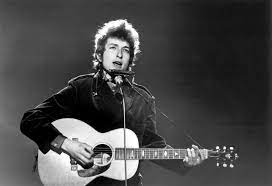
In a world ruled by the sweet and somber strums of acoustic guitars, there came a night when one man dared to buck the system. That man was Bob Dylan, and the date was July 25, 1965. The world of folk music, and indeed the wider spectrum of popular music, was about to be forever altered.
In the summer of 1965, the Newport Folk Festival, a hallowed haven for folk purists, was bracing itself for another night of acoustic harmonies and unamplified melodies. Little did the audience know that they were about to witness a seismic shift in the musical landscape.
As the sun set over Newport, a 24-year-old Bob Dylan – known to the world as a protest singer with an acoustic guitar and harmonica – walked onto the stage. Only this time, he wasn’t alone. Backed by the electric fury of the Paul Butterfield Blues Band, Dylan launched into a rocking rendition of “Maggie’s Farm.” The crowd’s reaction was swift and visceral. Cheers clashed with boos, adulation collided with outrage, and history was being written with every strum of the electric guitar.
Dylan’s decision to ‘go electric’ was not simply a change in instrumentation; it was a rebellion against tradition, a rejection of boundaries. Many saw it as a betrayal, a sell-out to the rising tide of rock and roll. Even Pete Seeger, a titan of folk music, was said to have been so infuriated by the raucous electric set that he attempted to cut the sound cables backstage.
Despite the controversy, or perhaps because of it, this incendiary performance became a landmark moment, marking Dylan’s transition from folk troubadour to rock and roll iconoclast. This wasn’t just about Dylan’s musical journey. It was a moment that embodied the restlessness of the times, reflecting the shifting tectonic plates of the 1960s cultural scene.
The echoes of Dylan’s electric set at Newport continue to reverberate through the annals of music history. His audacious act challenged the notion of musical genres as separate and unchanging. Instead, Dylan showed that artistry is fluid, that transformation is possible, and that rules are meant to be broken.
It was the night when Bob Dylan didn’t merely plug in an electric guitar; he plugged into a current of change that was to electrify the world. Today, we understand that Dylan didn’t sell out; he bought in — to evolution, to progress, and to the uncharted future of music. That night in Newport, Bob Dylan didn’t just play music; he changed its course forever.
Indeed, the times, they were a-changin’.





Leave a Reply